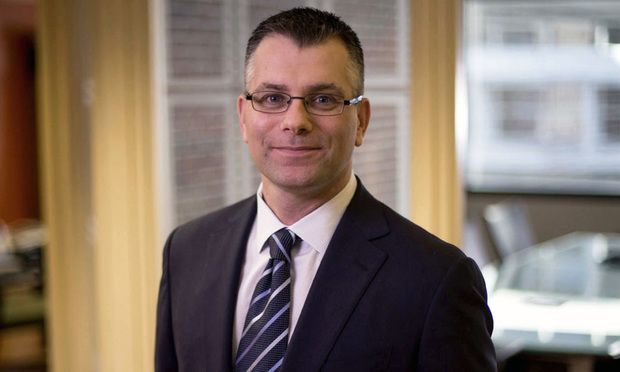$20 Million Loan Comes Back to Haunt Broward Law Firm, Defense Counsel
A motion for sanctions takes aim at several high-profile South Florida lawyers including noted appellate attorney Bruce Rogow.
February 01, 2018 at 02:37 PM
4 minute read

A motion for sanctions takes aim at several high-profile South Florida attorneys — Bruce Rogow, Albert Frevola Jr., Jessica Kopas and Michael E. Dutko Jr. — as an old debt comes back to haunt Conrad & Scherer.
The underlying breach-of-contract complaint could wipe out the Fort Lauderdale law firm under a motion asking the court to appoint a receiver to take control of Conrad & Scherer.
The 2017 lawsuit pits former client Douglas Von Allmen against the firm that represented him for years. The sanctions motion alleges Conrad & Scherer borrowed $20 million from Von Allmen to fund litigation against convicted Ponzi schemer and law firm chairman Scott Rothstein and to launch a national human rights practice.
One venture was successful, while the other embroiled the firm in ongoing multidistrict litigation and other suits in federal court. Von Allmen's court pleadings suggest Conrad & Scherer overextended its resources and sought to avoid the multimillion-dollar debt by alleging its client-turned-lender agreed to forego repayment in exchange for legal services.
Von Allmen claimed his money funded Conrad & Scherer litigation that helped recover millions of dollars for him and other victims of Rothstein, who led the defunct 70-attorney labor and employment firm Rothstein Rosenfeldt Adler. Those efforts won accolades for the firm and William Scherer.
A confidential settlement was reached with Bank of America N.A. on claims the bank knew about the $1.2 billion Ponzi scheme but still referred investors to it in hopes of landing business from Rothstein.
Von Allmen also claimed his loan funded human rights cases against multinational companies — a venture that has brought negative attention to the firm. Former Conrad & Scherer partner Terrence Collingsworth allegedly paid witnesses to change their testimony in a case accusing Alabama coal conglomerate Drummond Corp. of conspiring to kill labor activists in Colombia.
“We don't believe the law firm has the ability to pay us back, so we want to safeguard our interests,” said Von Allmen's attorney, Paul D. Turner of Perlman Bajandas Yevoli & Albright in Fort Lauderdale. “They're just rearranging the deck chairs on the Titanic. It doesn't matter what you do, the ship is still going to go down.”
Von Allmen alleges defense counsel presented baseless arguments to support their clients' position. His court filings ask Broward Circuit Judge John J. Murphy III to sanction the defendants and their lawyers — Rogow, Frevola, Kopas and Dutko — under a Florida statute that punishes attorneys and litigants for raising “unsupported claims or defenses.”
Rogow, a 50-year litigator, said he was “amused, bemused and unperturbed” by the motion for sanctions.
“Mr. Von Allmen's lawyers are frenetic filers. Their pleadings are always breathless,” he wrote in an email. “My co-counsel colleagues share my confidence that the motion is just a schoolboy tactic, devoid of merit.”
Defense lawyers had not responded by deadline to the motion for sanctions filed Monday.
Rogow's resume cites his argument of more than 450 civil and criminal cases in federal and state appellate courts. Frevola, Kopas and Dutko, meanwhile, are partners at Conrad & Scherer, which has offices in Florida, New York, North Carolina and Ecuador.
Von Allmen's pleadings paint a picture of a group of lawyers arguing a point despite tax filings and bank documents favoring his position.
“The crux of defendants' counterclaim is that not a penny of the $20 million debt to plaintiffs is owed. This is directly contradicted by the sworn positions of Conrad & Scherer and Bill Scherer to the Internal Revenue Service,” the sanctions motion said. “Counsel of record know their position in their defense to plaintiffs' claims and several counts in the counterclaim are unsupportable in fact or law.”
Rogow said Von Allmen is the one with the debt.
“That misses the point,” Rogow said of the reference to loan documents proving the debt. “There can be — and there were oral modifications of the loan. … On the firm's side of the ledger, money is owing.”
Details on the agreements between Von Allmen and the borrowers are scarce because attorneys on both sides asserted attorney-client privilege between the plaintiff and his former counsel and filed most of the court documents under seal.
This content has been archived. It is available through our partners, LexisNexis® and Bloomberg Law.
To view this content, please continue to their sites.
Not a Lexis Subscriber?
Subscribe Now
Not a Bloomberg Law Subscriber?
Subscribe Now
NOT FOR REPRINT
© 2025 ALM Global, LLC, All Rights Reserved. Request academic re-use from www.copyright.com. All other uses, submit a request to [email protected]. For more information visit Asset & Logo Licensing.
You Might Like
View All


U.S. Eleventh Circuit Remands Helms-Burton Trafficking Case Involving Confiscated Cuban Port
3 minute read
Miami Lawyer Guilty of Indirect Criminal Contempt But Dodges Paying Legal Fees
4 minute readTrending Stories
- 1'It's Not Going to Be Pretty': PayPal, Capital One Face Novel Class Actions Over 'Poaching' Commissions Owed Influencers
- 211th Circuit Rejects Trump's Emergency Request as DOJ Prepares to Release Special Counsel's Final Report
- 3Supreme Court Takes Up Challenge to ACA Task Force
- 4'Tragedy of Unspeakable Proportions:' Could Edison, DWP, Face Lawsuits Over LA Wildfires?
- 5Meta Pulls Plug on DEI Programs
Who Got The Work
Michael G. Bongiorno, Andrew Scott Dulberg and Elizabeth E. Driscoll from Wilmer Cutler Pickering Hale and Dorr have stepped in to represent Symbotic Inc., an A.I.-enabled technology platform that focuses on increasing supply chain efficiency, and other defendants in a pending shareholder derivative lawsuit. The case, filed Oct. 2 in Massachusetts District Court by the Brown Law Firm on behalf of Stephen Austen, accuses certain officers and directors of misleading investors in regard to Symbotic's potential for margin growth by failing to disclose that the company was not equipped to timely deploy its systems or manage expenses through project delays. The case, assigned to U.S. District Judge Nathaniel M. Gorton, is 1:24-cv-12522, Austen v. Cohen et al.
Who Got The Work
Edmund Polubinski and Marie Killmond of Davis Polk & Wardwell have entered appearances for data platform software development company MongoDB and other defendants in a pending shareholder derivative lawsuit. The action, filed Oct. 7 in New York Southern District Court by the Brown Law Firm, accuses the company's directors and/or officers of falsely expressing confidence in the company’s restructuring of its sales incentive plan and downplaying the severity of decreases in its upfront commitments. The case is 1:24-cv-07594, Roy v. Ittycheria et al.
Who Got The Work
Amy O. Bruchs and Kurt F. Ellison of Michael Best & Friedrich have entered appearances for Epic Systems Corp. in a pending employment discrimination lawsuit. The suit was filed Sept. 7 in Wisconsin Western District Court by Levine Eisberner LLC and Siri & Glimstad on behalf of a project manager who claims that he was wrongfully terminated after applying for a religious exemption to the defendant's COVID-19 vaccine mandate. The case, assigned to U.S. Magistrate Judge Anita Marie Boor, is 3:24-cv-00630, Secker, Nathan v. Epic Systems Corporation.
Who Got The Work
David X. Sullivan, Thomas J. Finn and Gregory A. Hall from McCarter & English have entered appearances for Sunrun Installation Services in a pending civil rights lawsuit. The complaint was filed Sept. 4 in Connecticut District Court by attorney Robert M. Berke on behalf of former employee George Edward Steins, who was arrested and charged with employing an unregistered home improvement salesperson. The complaint alleges that had Sunrun informed the Connecticut Department of Consumer Protection that the plaintiff's employment had ended in 2017 and that he no longer held Sunrun's home improvement contractor license, he would not have been hit with charges, which were dismissed in May 2024. The case, assigned to U.S. District Judge Jeffrey A. Meyer, is 3:24-cv-01423, Steins v. Sunrun, Inc. et al.
Who Got The Work
Greenberg Traurig shareholder Joshua L. Raskin has entered an appearance for boohoo.com UK Ltd. in a pending patent infringement lawsuit. The suit, filed Sept. 3 in Texas Eastern District Court by Rozier Hardt McDonough on behalf of Alto Dynamics, asserts five patents related to an online shopping platform. The case, assigned to U.S. District Judge Rodney Gilstrap, is 2:24-cv-00719, Alto Dynamics, LLC v. boohoo.com UK Limited.
Featured Firms
Law Offices of Gary Martin Hays & Associates, P.C.
(470) 294-1674
Law Offices of Mark E. Salomone
(857) 444-6468
Smith & Hassler
(713) 739-1250






